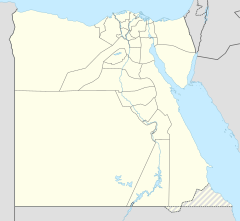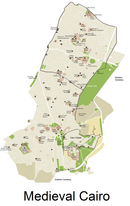Amir Jamal al-Din al-Ustadar Mosque
| Amir Jamal al-Din al-Ustadar Mosque مسجد جمال الدين يوسف الاستادار | |
|---|---|
 Qibla-Wall of Amir Jamal al-Din al-Ustadar Mosque | |
| Religion | |
| Affiliation | Islam |
| Region | Africa |
| Status | Active |
| Location | |
| Location | Cairo, Egypt |
| Geographic coordinates | 30°03′03″N 31°15′48″E / 30.050778°N 31.263227°E |
| Architecture | |
| Type | mosque |
| Style | Islamic |
| Completed | 1407 |
Amir Jamal al-Din al-Ustadar Mosque (Arabic: مسجد جمال الدين يوسف الاستادار) is a historic mosque in the city of Cairo. It is located inside Islamic Cairo, facing the Al-Tambakshiya Street to the north and the Habas al-Rahb Street to the southeast.[1]
History
The mosque was built in 1407 by and dedicated to Emir Jamal al-Din al-Ustadar, who served under the Burji Mamluk Sultan An-Nasir Faraj. The main purpose of the building is madrasa which taught all four Islamic schools of jurisprudence. It had been undergoing renovation which completed in 2001.[1][2][3]
The architectural style of the mosque is greatly influenced by the Mosque-Madrassa of Sultan Barquq. Although Jamal al-Din was an influential patron of many of the architectures during his era, his career was tumultuous and he was not mourned after his execution by Sultan An-Nasir. At the same time, the Sultan had attempted to tear down this mosque, but it was prevented by the qadi by erasing the name of Jamal al-Din from the mosque.[3]
Gallery
- dome and minaret
- iwan
See also
- Lists of mosques
- List of mosques in Africa
- List of mosques in Egypt
- List of Historic Monuments in Cairo
References
- ^ a b مدرسة الاستادار بالجمالية.. تتجمل! Archived 2016-09-19 at the Wayback Machine. Ahram. Retrieved January 12, 2018.
- ^ جديدمسجد جمال الدين الاستادار Archived 2017-11-09 at the Wayback Machine. Ahram. Retrieved January 12, 2018.
- ^ a b Masjid Amir Jamal al-Din al-Ustadar. Archnet. Retrieved January 12, 2018.
Bibliography
- Jarrar, Sabri, András Riedlmayer, and Jeffrey B. Spurr. Resources for the Study of Islamic Architecture. Cambridge, Massachusetts: Aga Khan Program for Islamic Architecture, 1994.




